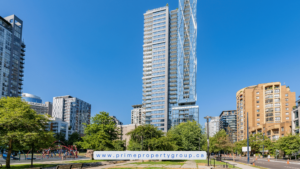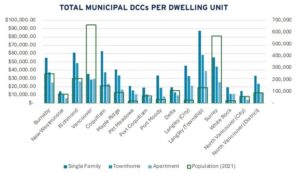
Development Cost Charges (DCCs) in Metro Vancouver are government-imposed fees that developers pay to support infrastructure for new developments. These fees vary widely between cities, and as DCCs continue to rise, the impact on both developers and homebuyers becomes more significant. In this post, we break down DCC rates across various Metro Vancouver municipalities and explain how they affect housing prices.
What Are DCCs, and Why Do They Matter?
DCCs help municipalities fund essential infrastructure—like roads, water supply, and sewage systems—required for new development. As cities grow, so does the demand for these services and the “growth pays for growth” i.e. developers are on the hook for these costs. However, as DCC fees increase, developers often pass them on to homebuyers, raising the cost of housing.
Comparing DCC Rates across Metro Vancouver
A recent report by the Homebuilders Association Vancouver (HAVAN) shows significant differences in DCC rates among municipalities. The Township of Langley, for example, has some of the highest fees in Metro Vancouver. For a single-family home, developers pay an average of $87,000 per unit in DCCs, which is $20,000 more than the next-highest city, Coquitlam, where rates average $62,000 per unit.
DCCs for Single-Family Homes
- Township of Langley: $87,000 per unit
- City of Coquitlam: $62,000 per unit
- City of Vancouver: $29,000 per unit
DCCs for Townhouses
The DCC rate for townhouses in Langley is $59,000 per unit, the highest in the region, followed by the City of Richmond at $49,000 per unit. These high fees can discourage townhouse developments, which many municipalities see as a more affordable housing option compared to single-family homes.
DCCs for Apartments
Langley also hits higher-than-average DCC rates for apartments, charging $39,000 per unit, compared to Vancouver’s $29,000 per unit. For a 100-unit apartment building, that adds up to $3.9 million in DCCs. Local governments regularly adjust DCC rates for inflation and meeting their budgetary needs, leading to significant cost increases over time.

Image Source: storeys.com
The Debate around Rising DCCs
Developers argue that high DCCs drive up the cost of housing, making homeownership less affordable. In Metro Vancouver, DCCs have more than doubled in some areas since 2020. Langley saw an 81% increase in DCCs for single-family homes, while Vancouver’s DCCs rose by about 20% across all property types.
The “growth pays for growth” approach remains a hot topic. Critics believe it unfairly shifts the financial burden onto homebuyers. At the same time, local governments claim that without these fees, they would have to raise property taxes, which is politically unpopular.
Upcoming Increases in DCCs
DCCs in the Metro Vancouver Regional District are set to increase further in 2025, 2026, and 2027, sparking a new wave of concerns from developers. Recently, developers launched a letter-writing campaign, demanding a reevaluation of these fees. Their goal is to limit the impact of rising DCCs on housing affordability.
Why This Matters to You
If you’re planning to buy or sell a home in Metro Vancouver, it’s essential to be aware of how DCCs affect housing prices. Higher DCC rates mean developers will likely pass those costs on to homebuyers, which could affect your budget.
Considering buying or selling a home in Abbotsford? We’re here to help you navigate these changing DCCs and make informed decisions that fit your financial goals. Contact us today to get started!